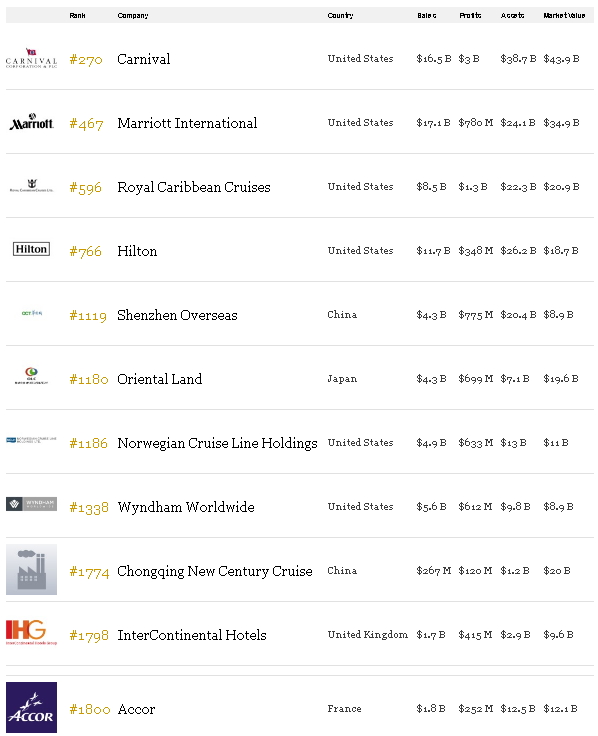When most Americans think of hotels, they think of the most familiar names where, on every continent but Antarctica, they can get a room for the night or longer. Hotels mean temporary shelter, rooms with a very short minimum rental period to a maximum of staying forever. Most of them have already risen mightily this year.
But here’s a slightly different take on what constitutes “lodging” courtesy of Forbes’ 2017 version of The World’s Biggest Public Companies, as measured by an amalgam of sales, profits, assets and market value.

The 270th biggest company in the world and the #1 company listed under the “Hotels & Motels” category does not provide land-based rooms at all. Who is it? Carnival Corp, which controls not just the estimable Carnival Cruise Lines but also all these independently-operated lines as well. (Think Berkshire Hathaway’s limited hands-on approach to its many subsidiaries. In cruise industry terms, each line appeals to a different demographic and psychographic.)

There is a certain logic to considering Carnival the world’s largest hotelier. After all, with the exception of repositioning cruises and those featuring extended sea time, your cruise includes a fine hotel room (from which you never have to unpack for the duration of your travels) in some of the world’s great destinations. Add up the cost of hotels in those cities and smaller venues, dining out every day and getting transportation arranged for whatever excursions you are taking and you may well conclude that it is not only cheaper than staying in land hotels, it is also less enervating.
There are even those who suggest that, as long as you don’t need regular medical care but are still considering moving to one of those buy-your-own-apartments at a care facility where meals and regular housekeeping, as well as movies and other entertainment and fitness classes and facilities, are provided, you might consider perennial cruising instead! Done right, it can be cheaper and the views more interesting…
But that’s an article for another time. Besides, much as I like to buy the cruise lines as a trade whenever they are depressed, they are not depressed today. They have moved up as a bloc along with the market so I can’t find compelling value here. For now, we’ll start our exploration of the “hotel industry” with the 467th biggest publicly-traded global company and the biggest land-based hotel: According to Forbes, that would be Marriott International (MAR).
Not bad for a company that began as a nine-seat A&W root beer stand in Washington D.C. Today Marriott boasts more than 6,400 hotels with 1.1 million rooms in more than 120 countries. But when they say they “offer” these rooms you’ll notice they don’t say they “own” these rooms. They do own some of them, but therein lies the great lesson of how hotels really work.

You look at all these names above and wonder how any company could keep track of them all. It looks more like a conglomerate than a hotelier. But like Carnival and all the other lodging and travel specialists, Marriott realizes that the demographics and psychographics that draw travelers to one or a handful of hotels time and again require this kind of diversification. Budget travelers need the certainty of knowing they will be well-served along their way, business travelers demand something very different, those who have struggled and achieved much feel they deserve something still different, and so on.
It would be quite difficult to stay on top of all this if Marriott owned all these hotels, or tried to apply one particular management style to all of them. That is precisely why they typically do not even attempt to do so. Some hotels are owned, managed and branded by the same company. The J.W. Marriott in D.C. and the Key Bridge Marriott just a few miles away in Rosslyn VA, where I stayed on many a temporary duty at the Pentagon and other sites around D.C. are examples of how hotels used to do things. Both are company owned, managed and branded.
But the kind of debt a company would have to take on to buy the properties, and the different kinds of management each demographic might require, means that today when a company talks about its properties, as likely as not most if not all of those properties are owned by someone else or managed by someone else.

















Leave A Comment